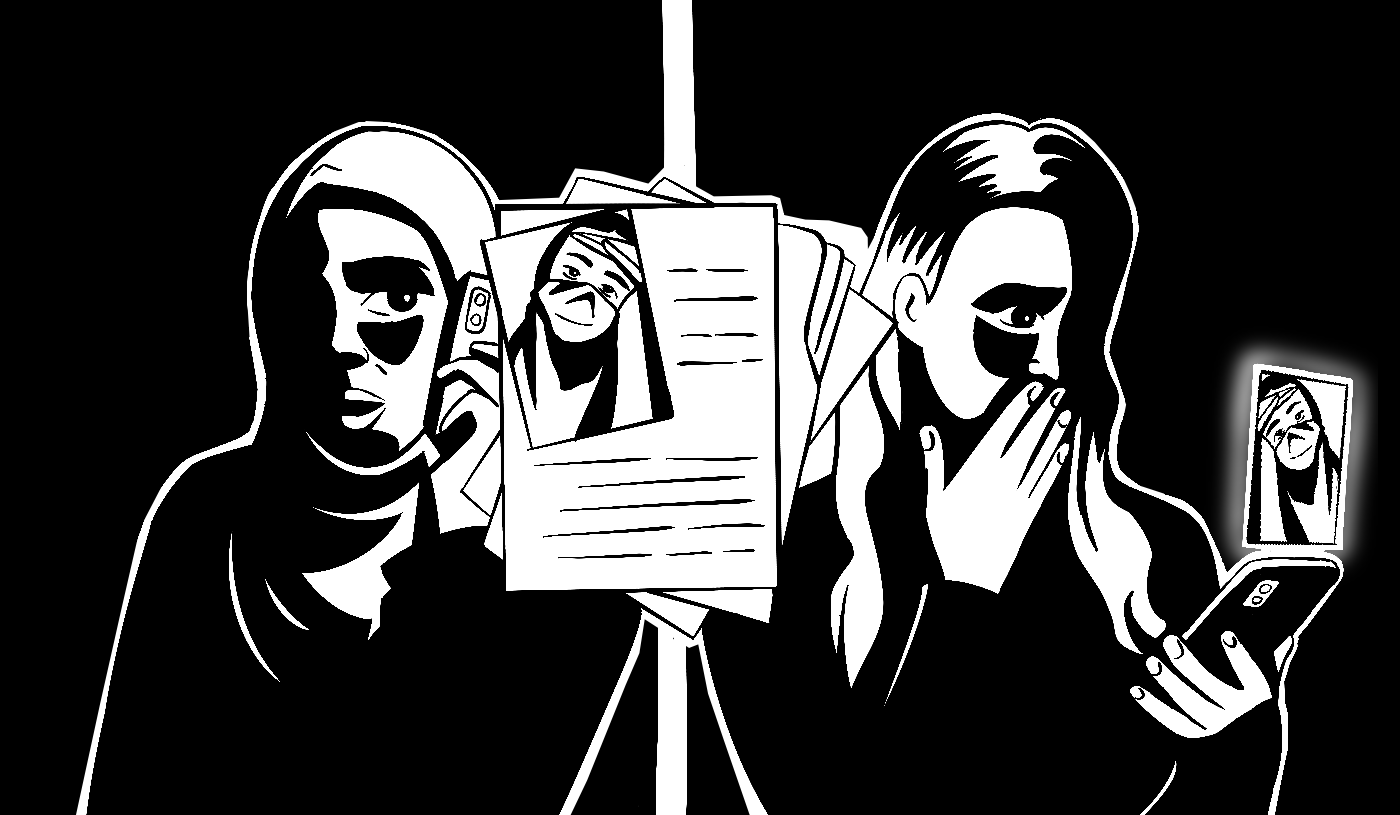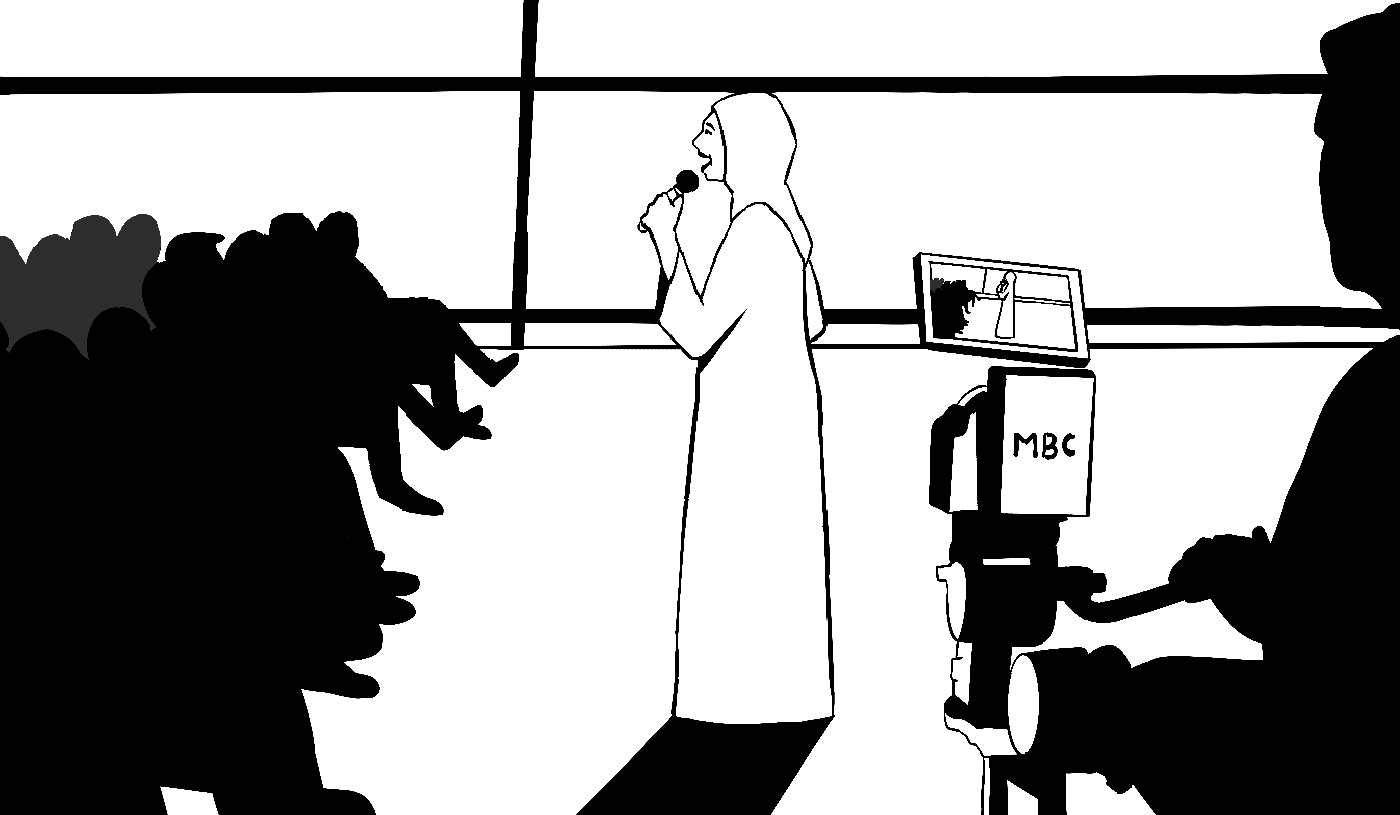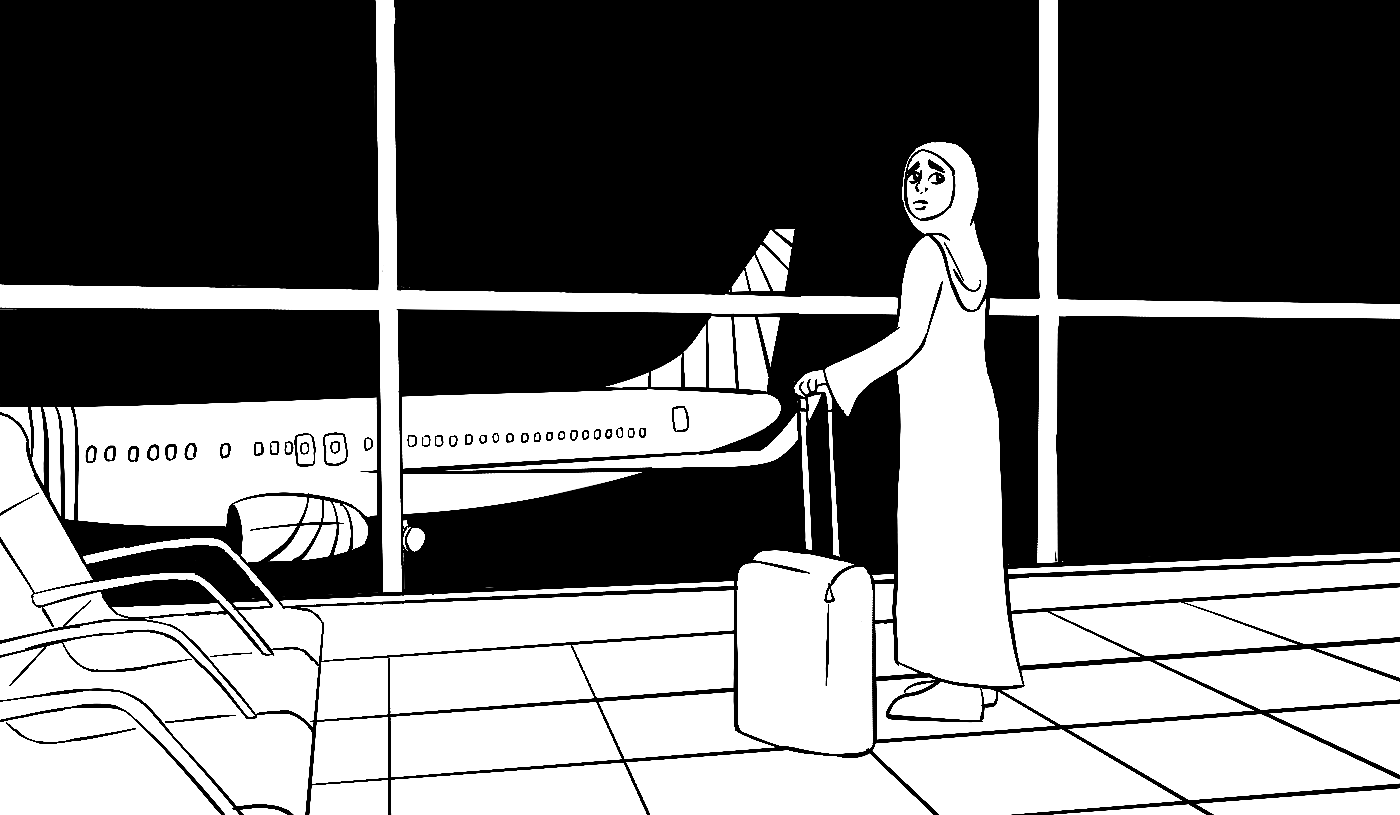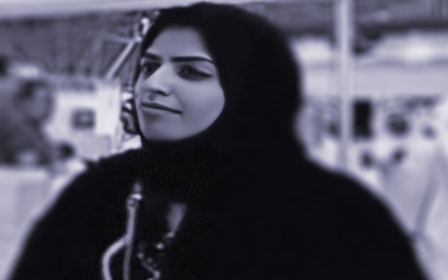
These young Saudis spoke up on social media. Then they disappeared
How would people talk about her if she disappeared suddenly? The thought bubbled around Lina Alsharif’s mind for days.
But there was often a lot on her mind. Working shifts as long as 30 hours at the Riyadh Armed Forces Hospital, the 33-year-old doctor, her airpods tucked in her ears, debated Saudi policies in chatrooms.
Rattling off facts and figures from memory as she did her rounds, she was gaining a reputation as someone who could quickly defuse - and often pointedly correct - pro-government gadflies.
“Someone might say, ‘Ok, let’s talk about the kind of achievement the Saudi government did recently with numbers,’” said Anoud*, who has known Lina for more than a decade.
“She would be multi-tasking and she would be like, ‘Oh no, this is not correct because the actual numbers are X, Y and Z’.”
Stay informed with MEE's newsletters
Sign up to get the latest alerts, insights and analysis, starting with Turkey Unpacked
Alsharif rolled along like this, expressing herself anonymously - or so she thought until one day last May, in a chatroom with 1,000 listeners, there was a discussion about the Saudi opposition and how to shut it down.
There is a doctor, a voice said, who claims she is abroad, but she is actually working at a hospital in Riyadh. “Her day is coming soon,” he said.
A friend of Lina’s heard the chat and warned her.
“They always say this,” she said, shrugging it off.
But over the next few days, she was threatened repeatedly online with the same warning: we are coming for you.
So Lina hired a legal representative. If something happens to me, she instructed him, tell my story and protect me. She signed a document officially appointing him.
A few hours later, she was gone.
Faith in anonymity
Alsharif is one of at least 14 Saudi Arabians in their 20s and 30s who were forcibly disappeared in May and June 2021 over their social activism online. They have become known as the "May detainees", but before they vanished, they were virtual nobodies.
They used pseudonyms and attracted few followers. Even people they talked with for months or even years - sometimes about their most private struggles - didn’t know their real identities.
“We have this convention and understanding between us activists on social media not to ask so many questions,” said Hessa*, who was in touch with one of the detainees. “You never know where these answers will go.”
In an era of unprecedented repression in their country, engaging online was cathartic. They could voice concerns about poverty, unemployment or domestic violence, some of which they had personally experienced.
A few were members of “The Bees”, an online initiative started by slain journalist Jamal Khashoggi and Saudi Arabian dissident Omar Abdulaziz to combat pro-government misinformation and messaging. But not all.
They knew what they were doing was risky. But there is an overriding sense that they were pursuing a higher mission - a bettering of their society through calling out its failings, supporting the most vulnerable and each other - and faith that, in pseudonymity, there was safety.
But they were not safe. One by one, across several weeks last spring, they were picked up by special forces that report directly to the Royal Court and taken away. First there was Abdullah Jelan and then Rina Abdulaziz and then Yasmin Algufaily and the list goes on.
At least, this is what happened to the 14 we know about. This is the story of three of them - Lina Alsharif, Asma Alsubaie and Abdullah Jelan - as told to Middle East Eye by their friends and legal representatives, who are all living outside the kingdom, and based on communications made by and filed with the UN.
It’s possible there are many more, some estimate in the hundreds. The Saudi government did not respond to MEE's request for comment for this story. But because they were using pseudonyms and because their friends and family may fear reprisal if they speak out, no one actually knows.
The genius
Lina Alsharif hadn’t set out to become a virtual debater or even political, but she had always questioned what she was told - which was why, as Anoud tells it, they became friends.
In 2011, the two were attending university. Lina studied medicine; Anoud studied law. “I was questioning the law and she was questioning science,” Anoud said.
These kinds of questions, particularly ones which challenged religious teachings, weren’t very welcome at home or publicly. So they voiced them with anonymous social media accounts.
“During the era of King Abdullah, people did have a little bit of freedom to express themselves,” she said. “People were whining and complaining and explaining.”
And it was through social media that the two first connected and soon learnt not only were they in the same town, but they were also at the same university.
“It was kind of an exciting thing to say, ‘Let’s meet up in a coffee shop’,” Anoud said of the friends like Lina whom she made online. “You don’t work with them, you don’t go to school with them. We just had pure interests. So no judgements, no masks.”
For the next 10 years, even as Anoud moved to the US, they remained friends and continued to serve as sounding boards for one another at different points in their lives.
After Jamal Khashoggi’s killing - which Anoud described as “the scandal on October 2, 2018” - she said something shifted inside her. “When I had a little bit of hope, I lost it and so did a lot of Saudis. It made me feel like our souls are so cheap,” she said.
In Riyadh, Lina was working at an emergency room where she was treating victims of police brutality and domestic violence. She told Anoud how authorities failed to investigate their cases or hold anyone accountable. Lina was horrified, yet she couldn’t talk about it openly.
'Things were becoming so disgusting. People were acting like robots. It was becoming a super gaslighting culture'
“Things were becoming so disgusting. People were acting like robots. It was becoming a super gaslighting culture. She was so suffocated by it everywhere, at home, in the hospital.”
So in the middle of the Covid pandemic, Anoud and Lina became more active on social media, finding like-minded Saudi Arabians virtually that had evaded them in reality - and arguing freely over the direction of their country. “We were talking about civil rights and why things aren’t working,” Anoud said.
At this point in our discussion, Anoud grows really animated. Lina, she wants me to understand, was a standout debater. She could recall figures quickly. She was never emotional. Running out of examples, but still at pains to deliver this point, she blurts out: “She is a genius.”
And this is exactly why she thinks Lina is no longer free. In late May 2021, forces from the Presidency of the State Security (SSP) - a body established as Mohammed bin Salman ascended to his role as crown prince - raided her family’s home and took her away in handcuffs, saying only that she was wanted for investigation.
For four months, there was no public information about where she had gone. In September 2021, in response to a communication sent by the UN Working Group on Enforced Disappearances, the Saudi government disclosed that she was being held in Al’Ha’ir Prison, a 19 million-square-foot maximum security facility run by the Saudi secret police which holds scores of political prisoners.
She was detained in accordance with two articles of the Combatting Terrorism and Financing of Terrorism Act, a controversial law also established with the crown prince’s rise to power. Since then, there has been no further information released about her.
Anoud believes the voices threatening Lina couldn’t take her ability to run circles around them. “They were very emotional and it was hard to compete with her,” she said.
“It’s all in order to protect this fragile ego. They use all kinds of security to protect someone’s insecurity.”
The defender of defenders
For months, Hajar* had been talking online about human rights with someone she knew only as User 1*.
When Hajar saw that the government stipend that was supposed to cover the rising costs of living was decreasing each month in her paycheck, she wanted to sound off, and doing it online was the only option.
Once she spoke out, she was surprised to see how users she’d never met stood up for her. Slowly, hearing the problems and issues they were facing, she felt compelled to speak up for them too. She met User 1 along the way.
“We talked about everything to do with human rights,” she recalled. “But the thing we talked about most, as women and feminists, was domestic violence.”
User 1 posted frequently in defence of women’s rights and in support of victims of domestic violence and detainees, calling for their trials to be held publicly and criticising sentences against them over comments they made online.
'It was a horrible day. I didn’t sleep. I was thinking, when will the government arrest me? How will the government arrest me?'
One day, Hajar told User 1 about a personal struggle she was having. She wouldn’t tell me what it was exactly. But when she told her online friend, User 1 responded: “I have the same problem.”
The two grew close and, in May 2021, she asked Hajar for a favour. “If I’m arrested, you talk about me. Don’t wait for my family. They won’t want to talk to human rights organisations,” User 1 told her.
User 1 had recently warned on social media that she had been betrayed by someone very close to her. She was making preparations. “One of my friends will come to you and they will give you my information if I disappear,” she said.
Hajar knew very quickly when her friend had been arrested. She had failed, uncharacteristically, to show up to an online chat that she normally helped run.
User 1 was gone. Who was next, Hajar worried. “It was a horrible day. I didn’t sleep,” she said. “I was thinking, when will the government arrest me? How will the government arrest me?”
As days passed and she remained free, a rumour spread that User 1 had been given up by the person she tweeted about which gave Hajar some solace. Perhaps she was safe.
But she was then left to wonder about the mystery friend who was going to give her User 1’s details. One week passed, and then another. Nothing. Where were they? After a month she noticed someone on social media writing emotionally about User 1. She sent a message.
Message by message, the Twitter user and Hajar sniffed each other out, testing as best they could whether the other was the genuine friend of User 1 that they claimed to be. Finally convinced of one another, they spoke.
On the end of the line was a woman who said she was in Syria and often without internet, which was why it had taken her a while to get in touch about User 1.
She had met User 1 while playing PUBG, an online combat game that dozens can play from all over the world at one time. User 1, she said, was in fact 22-year-old Asma Alsubaie.
Calls for help on rials
Alsubaie, Hajar would find out, was in her senior year at Princess Nourah University in Riyadh.
On 1 June, SSP raided her house, seized her electronic equipment and took her away. To where, Hajar and Asma’s supporters did not know.
But with photos and details shared from the Syrian woman, whom Asma had never met in person, they set to work contacting human rights organisations and sharing her story on social media.
They also wrote her name on 500 rial banknotes, knowing that the large bills were bound to circulate. Even if none of those holding the bills in their wallets saw her name, eventually a bank employee would have to see it when the currency was replaced.
“We were very keen on everyone knowing Asma,” said Hajar “She is not just a number.”
Asma, like Lina, is also being held in Al’Ha’ir Prison, the Saudi government disclosed this January in response to a joint letter sent by multiple UN working groups and special rapporteurs which raised concerns about her case.
In their letter, Saudi authorities highlight the UN’s concerns that Asma “was arrested in response to her posts on Twitter”, which they do not deny, but note that she was arrested in accordance with the kingdom’s Combatting Terrorism and Financing of Terrorism Act.
The letter says she has been charged, but does not say with what. It adds that she has appeared at least twice in court and is represented by a state-funded lawyer assigned to her. “She enjoys the right to regular visits and telephone calls,” it says. “She receives the necessary medical care and is in good health.”
Unlike Lina, the Saudi response to the UN is not the last bit of information that Asma’s friends have had about her. This June, she appeared for several seconds in an MBC news report about Al’Ha’ir.
She can be seen singing on a stage at a concert entertaining the visiting relatives of prisoners. "At first, I used to hear that prisons only are cells and a wasted life," a prisoner tells MBC's reporter. "We have things that people wouldn't imagine here. From activities to events, they are rehabilitating us to live our lives outside prison."
These types of reports from Saudi prisons which are presumably staged are not unique to the May detainees. Remember Saudi Prince Alwaleed bin Talal giving journalists a tour of the Ritz during the crown prince’s purge? There is also footage of Saudi singer Rabea Hafiz, who was picked up in September 2017 during a different wave of arrests, performing from Dhahban Prison.
And Asma isn’t the only May detainee to disappear only to reappear on television. This April, Yasmin Algufaily also turned up in a report from Buraydah State Security Prison. The 27-year-old was a personal trainer before she was forcibly disappeared in May 2021.
She didn’t cover her head prior to her arrest, but appears in a niqab as she gives a reporter a tour. “We have a classroom, a childcare section and a gym which I look after,” she says.
“I had previous experience with training and encouraged other inmates to join me. They’re excited.”
Familiar pattern
The disappearances of all three May detainees in this story fits a pattern of systematic repression that rights advocates and researchers say has been ongoing since 2017.
It was that summer that Mohammed bin Salman replaced his cousin, Mohammed bin Nayef, as crown prince - and when much of the power and responsibility of the state security was shifted from the Ministry of the Interior that the elder royal had run directly to the Royal Court.
Two new bodies - the Presidency of State Security (SSP) and the Public Prosecution Office (PPO) - were established by royal decrees, and followed several months later by a new counterterrorism law which, among other things, defines any act which disturbs public order as terrorism.
Armed with the new law, the SSP and the PPO, overseen by the Royal Court, have worked hand-in-hand with the Specialized Criminal Court to shut down hundreds of critics of the crown prince’s policies in waves of arrests and prosecutions.
Activists and rights advocates have identified a recognisable pattern: Someone speaks out. Agents of the Mabahith, the Saudi secret police which is under the SSP’s authority, turn up at a house, often plain-clothed, and arrest them without justification.
They are then taken to SSP-run prisons where they are held incommunicado for weeks or months or even years and tortured to extract confessions. The person then reappears, charged with security or terrorism-related crimes.
After a trial before the Specialised Criminal Court, frequently held in secret and routinely violating due process, they are given long sentences, often based only on their coerced confessions.
In May 2020, the UN Working Group on Enforced Disappearances raised alarm bells over the pattern, telling the UN General Assembly that Saudi Arabia’s legal framework had failed to protect its people from enforced disappearance which was being used as a tool of suppression.
“The unchecked and increased concentration of power with the royal authority which has undermined judicial independence has contributed to a culture of impunity, and investigative rules and practices have fostered the occurrence of enforced disappearances,” it wrote.
The UN special rapporteur on the promotion and protection of human rights and fundmental freedoms while countering terrorism had concluded, following a 2017 visit to Saudi Arabia, that the kingdom’s failure to provide minimum safeguards against torture as well as its judicial practice of using coerced confessions as evidence “strongly suggests that the practice of torture is officially endorsed”.
Extreme sentencing
These practices took an even darker turn this August when news emerged of the Specialised Criminal Court handing down a 34-year sentence and 34-year travel ban to Salma al-Shehab, a Leeds PhD candidate and mother of two, over her tweets.
It was the longest sentence ever given to a women’s rights defender. A week later, it came to light that a second Saudi woman - Noura al-Qahtani - had been given 45 years over her tweets.
Their extraordinarily lengthy sentences shocked even seasoned observers of Saudi Arabia and made international headlines and opinion pages.
Fionnuala Ni Aolain, UN special rapporteur on the protection of human rights while countering terrorism, wrote that Shehab’s supposed crime “makes a mockery of any kind of serious discourse about counterterrorism”.
“The kingdom of Saudi Arabia is systematically abusing counterterrorism laws to target human rights defenders, women who speak their mind, journalists and anyone who seems to step out of line no matter how minor the infraction might be,” Ni Aolain said.
Mary Lawlor, UN special rapporteur on the situation of human rights defenders, who has raised Asma’s case with Saudi authorities, told me she was concerned that the May detainees could face sentences like those handed to Shehab and Qahtani.
“Defenders in Saudi are at real risk of being sent to prison for very long terms. Many are serving sentences of over ten years,” she told me.
“While no one should ever be in jail for their peaceful human rights work, these long sentences are particularly cruel. We have seen what these long sentences do to the defender, to their families and communities, and the suffocating effect they have on others wanting to promote human rights.”
Friends of the May detainees said the sentencing of the women had made them extremely nervous.
The day after Salma al-Shehab’s sentence came to light, a friend of Abdullah Jelan’s told me he had heard that court proceedings for the 30-year-old he grew up with were about to begin. He is terrified.
The graduate who wanted more
Nasser* said he has known "Abdul", as he calls Jelan, for so long that he can’t remember exactly when they met.
Growing up, they shared a sense that there was a bigger world beyond Saudi Arabia. “We were always looking around about what was going on in the world, all that awful stuff like wars in Palestine and Yemen,” he said.
Nasser described his friend as a simple, uncomplicated guy, gentle with family and friends, and a practicing vegan who loves cats. “It wasn’t only human rights. He was also an animal rights activist,” he said.
Abdul’s dream, he said, was to become a health educator in the kingdom and he went to West Chester University in Pennsylvania on a Saudi scholarship to study public health. While there, he met his fiancee, who was also studying abroad.
Abdul was also tuned in to Mohammed bin Salman’s promises of reform. “He was young and he was talking about young people and how many opportunities he will provide and the change he is going to make,” said Nasser. “That kind of tricked a lot of people. Abdul was smart, but he thought, at the end of the day, there is nothing better than home.”
But when he returned to Saudi Arabia and applied to work for the Ministry of Health, he was told that his degree wasn’t recognised. For three years, he tried to sort out what he believed was a very simple bureaucratic error. He even went to court.
Meanwhile, he worked as an Uber driver while still planning to marry his fiancee. “It made him feel very bad and very down,” said Nasser. “He was like, ‘I want to go to social media and at least try to speak about it and just let it out.’” So he tweeted anonymously.
A face with a name
It’s still unclear how it is that Saudi authorities were able to connect Abdul to his account which had around 400 followers at the time of his arrest. Lawyers and supporters say this is true of all of the May detainees: no one can say exactly how they were identified when everything they did online was anonymous.
There are theories and suspicions, heightened by the conviction in August of a former Twitter employee who leaked the data of 6,000 users to Saudi authorities in 2015 in exchange for cash and expensive gifts.
Those leaks are believed to have resulted in the forced disappearances in March 2018 of Abdelrahman Alsadhan, a Red Crescent employee who was tweeting anonymously, and journalist Turki bin Abdulaziz al-Jasser. Alsadhan, whose family says he was tortured while in custody, has since been sentenced to 20 years in prison.
Somehow, Saudi authorities had identified Abdul. On the evening of 12 May 2021, he was abducted from his mother’s house in Medina by 20 plainclothes SSP agents who arrived in a six-car convoy, according to MENA Rights Group.
They took all of the electronic devices in the house, including his mother’s mobile phone, while at least one of Jelan’s two younger brothers witnessed the chaos. He has been too scared to return home since that day.
After the arrest, Jelan’s fiancee sent text messages to Jelan’s mother, trying to find out what had happened to him. She received a message back saying Abdullah “was fine”, according to the MENA Rights Group which has documented his case.
But then, the messages warned the fiancee she would be reported and banned from entering Saudi Arabia as a result of her online activism.
MENA Rights Group says that they believe it was SPP officials, not Jelan’s mother, sending the texts.
Jelan’s family learned that he was being held in a Mabahith-run prison in Medina where he was subjected on two separate occasions to torture with a rod emitting around 360 volts of electricity while he was interrogated.
He was shackled and kept in solitary confinement, and later moved to another Mabahith-run prison in Dhabhan.
In response to a complaint filed with the UN working group, Saudi authorities said in July 2021 that Jelan was arrested under the 2017 Combatting Terrorism and Financing of Terrorism Act.
If Abdul’s arrest was meant to shut down dissent, it hasn’t worked on Nasser. “To be honest, before he was arrested, I was interested in human rights, but I was also busy with my life,” he said. “But after, I got really deeply involved.”
The miracle worker
Lina Alsharif’s friends who were inside the kingdom when she vanished have also experienced major repercussions in their lives.
Two of them told me they have both fled the kingdom over the past year fearing that they too would be picked up, either over their own social media activism or their advocacy for Lina.
One of these friends, Hessa*, said long before she had to escape quickly on a night flight, Lina had changed the course of her life.
After the two became acquainted online, Hessa confided in Lina about gender identity issues she was facing. “I felt support from her,” she said.
Lina taught her how to fight her corner in a debate. From prisoners of conscience to victims of domestic violence, she was always with the oppressed. It was inspiring, and Hessa became increasingly vocal online too.
“She encouraged me to be as courageous as I am today,” said Hessa. “She always encouraged me and told me that one day, I would be free.”
It must be difficult, I said to Hessa, that the person who freed you in so many ways is now not free. She was silent for a long while and then I heard muffled crying over the phone.
Hessa was distraught when she learned Lina had been taken away. As other supporters scribbled Lina’s name in university library books or on banknotes, Hajar lashed out on social media with abandon.
“It’s a miracle she made it out,” another friend of Lina’s listening to our conversation interjects.
Several months ago, Hessa said she received messages on Twitter warning her to stop talking about Lina Alsharif “or else”. Soon after, her true identity, address and school were leaked online, and she knew she had to run.
*Names of the friends of May detainees interviewed in this story and the online user name of one of them have been changed for their protection.
Middle East Eye delivers independent and unrivalled coverage and analysis of the Middle East, North Africa and beyond. To learn more about republishing this content and the associated fees, please fill out this form. More about MEE can be found here.









